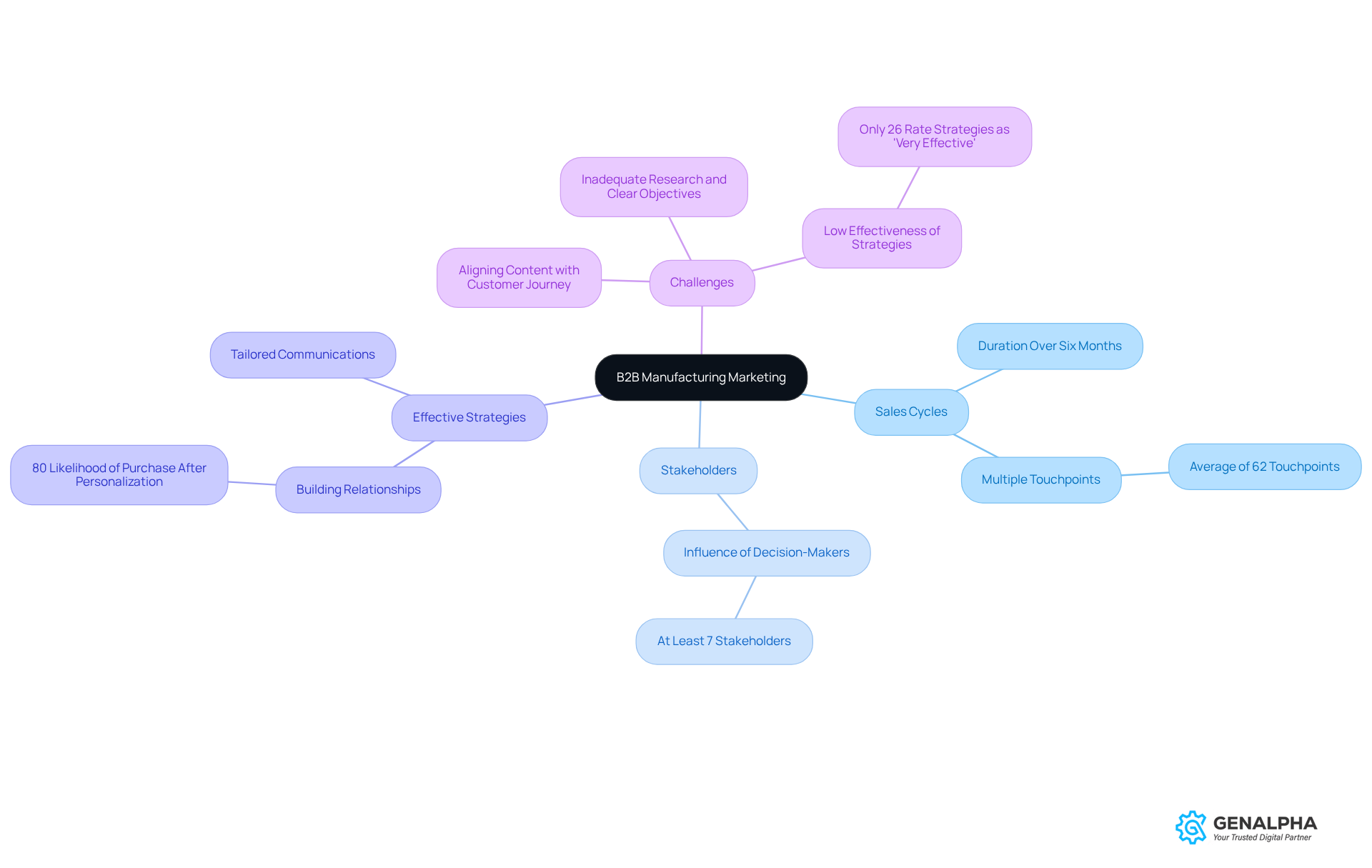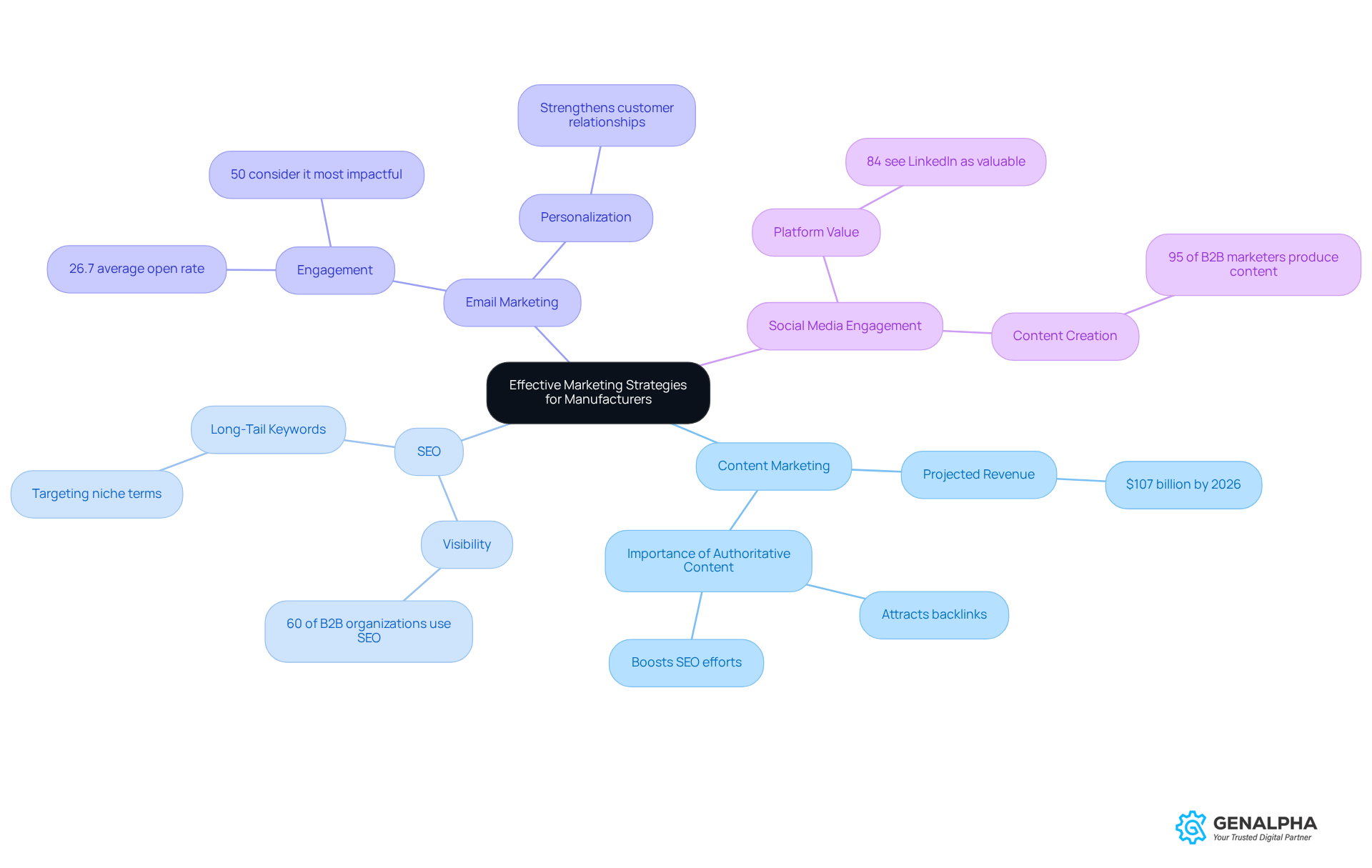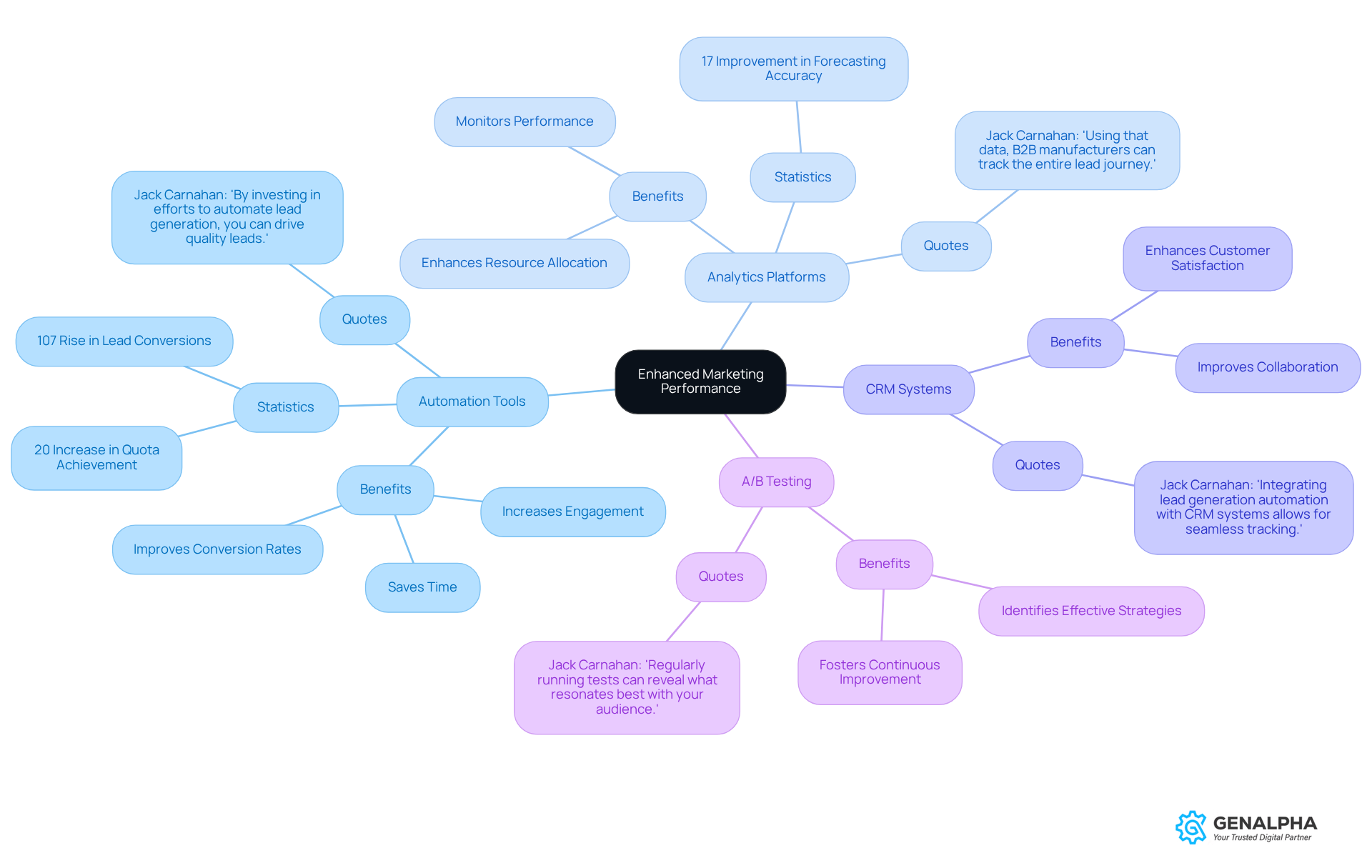Overview
When it comes to B2B marketing for manufacturers, there are some best practices that really stand out. Think about it:
- Focusing on content marketing
- Optimizing for search engines
- Tapping into digital solutions like automation and analytics
These strategies not only boost engagement and visibility but also lead to real, measurable improvements in lead generation and conversion rates. Isn’t that what we all want? This approach tackles the unique challenges we face in the B2B manufacturing landscape, making it easier to connect with our audience and drive results.
Introduction
In the intricate world of B2B manufacturing, marketing strategies must navigate a landscape defined by prolonged sales cycles and complex decision-making processes. Have you ever thought about how manufacturers engage multiple stakeholders while addressing industry-specific regulations and standards? This article dives into effective practices that can transform your B2B marketing efforts.
We’ll explore:
- Relationship-building
- Content creation
- Digital solutions that drive success
As the industry evolves, how can you adapt your strategies to not only meet but exceed the expectations of your diverse clientele?
Understand the Unique Landscape of B2B Manufacturing Marketing
In the realm of B2B marketing for manufacturers, promotion exists in a unique world where sales cycles can stretch beyond six months and purchasing processes often feel like a maze. Unlike traditional consumer markets, where the focus is on individual buyers, manufacturers are primarily dealing with organizations. This calls for a strategic approach that understands the complex decision-making hierarchies at play. Did you know that in companies with around 500 employees, at least seven stakeholders usually influence buying decisions? This highlights the need for targeted promotional strategies in B2B marketing for manufacturers that cater to diverse interests and challenges.
Now, let’s talk about what really works in B2B promotions. Building relationships is key! In fact, a whopping 80% of B2B buyers are more likely to make a purchase after a personalized interaction. This shows just how crucial it is to nurture long-term relationships through tailored communications and ongoing engagement. Plus, manufacturers have to navigate industry-specific regulations and standards that can greatly impact their promotional efforts.
However, promoting in the B2B manufacturing space isn’t without its challenges. One major hurdle is aligning content strategies with the customer journey while also addressing the frustration that comes from unclear objectives and inadequate research. As industry experts point out, many marketers struggle to produce actionable content that actually drives conversions, with only 26% rating their strategies as 'very effective.' By understanding these unique elements and challenges, manufacturers can utilize B2B marketing for manufacturers to craft more effective promotional campaigns that resonate with their audience and tackle crucial pain points, like the need for efficiency and reliability in purchasing processes.
So, how can you ensure your promotional efforts hit the mark? Let's dive deeper into these strategies together!

Implement Effective Marketing Strategies for Manufacturers
To effectively engage in B2B marketing for manufacturers, companies should focus on several key strategies that can really make a difference.
-
Content Marketing: Have you thought about how informative content can tackle industry challenges? Developing content that showcases your expertise—like whitepapers, case studies, and blog posts—can be crucial. This not only provides value to potential clients but also has a significant financial impact. In fact, content promotion is expected to generate a whopping $107 billion in revenue by 2026! Plus, manufacturers who create authoritative content can attract backlinks, boosting their SEO efforts and driving organic traffic.
-
Search Engine Optimization (SEO): Now, let’s talk about visibility. Optimizing your online content for search engines is essential. This means using relevant keywords that your potential customers are likely to search for, ensuring your company pops up when buyers are seeking solutions. A solid SEO strategy can really enhance organic traffic, leading to more qualified leads and higher conversion rates. Did you know that 60% of B2B organizations are already employing SEO tactics? It’s a common practice that pays off!
-
Email Marketing: What about nurturing leads? Targeted email campaigns are vital for keeping your existing customers engaged. Personalized emails that offer insights, updates, and special offers can significantly strengthen customer relationships. With the average open rate for B2B emails sitting at 26.7%, effective email strategies can drive substantial engagement and conversions. Interestingly, 50% of US B2B promoters consider email outreach the most important part of their multichannel approach.
-
Social Media Engagement: Let’s not forget social media! Leveraging platforms like LinkedIn to connect with industry professionals and share valuable content is key. Engaging with your audience through social media can help build brand awareness and credibility. In fact, 84% of B2B marketers see LinkedIn as the most valuable platform for reaching targeted audiences. Plus, 95% of B2B marketers are creating social media content, which shows just how widely it’s being used in B2B promotion.
By applying these strategies, producers can effectively connect with their target audience through B2B marketing for manufacturers, enhance online visibility, and drive conversions. For instance, a contract producer that used these techniques experienced a 30% increase in qualified leads within just six months. That’s a real testament to the power of a thorough promotional approach! So, are you ready to take action and implement these strategies in your marketing efforts?

Utilize Digital Solutions and Analytics for Enhanced Marketing Performance
Integrating digital solutions and analytics into b2b marketing for manufacturers is a game changer. It allows them to keep an eye on performance and make informed choices. So, how can we make the most of this? Here are some best practices:
-
Implement Automation Tools for Promotion: Think about using tools that automate those repetitive tasks—like email campaigns, social media posts, and lead scoring. This not only saves you time but also keeps communication consistent with potential clients. The result? Increased engagement and conversion rates! In fact, companies that embrace automation often see a 20% bump in quota achievement.
-
Leverage Analytics Platforms: Analytics tools are your best friends when it comes to monitoring website traffic, user behavior, and campaign performance. By figuring out which strategies are effective, manufacturers can enhance their b2b marketing for manufacturers by allocating resources more efficiently, boosting overall promotional effectiveness. For instance, businesses that dive into advanced analytics have reported a 17% improvement in forecasting accuracy.
-
Customer Relationship Management (CRM) Systems: Have you considered implementing a CRM system? It helps manage customer interactions and data throughout the customer lifecycle, enabling you to tailor your promotional efforts. This not only enhances customer satisfaction but also builds loyalty. Plus, when you incorporate lead generation automation with CRM systems, it smooths out the monitoring of the entire lead journey, improving collaboration between your promotional and sales teams. As Jack Carnahan puts it, "Integrating lead generation automation with CRM systems allows for seamless tracking of the entire lead journey."
-
A/B Testing: Don't forget about A/B testing! Regularly running tests on your promotional campaigns can reveal what resonates best with your audience. This iterative approach fosters ongoing enhancement and optimization of your strategies, ensuring your efforts align with customer preferences.
By adopting these digital solutions and analytics, producers can significantly enhance their promotional performance in the context of b2b marketing for manufacturers. This leads to better outcomes and a stronger competitive edge. For example, manufacturers using marketing automation have reported an impressive 107% rise in lead conversions, showcasing a substantial improvement in sales performance. So, why not give these strategies a try?

Conclusion
In the competitive world of B2B marketing for manufacturers, getting a grip on the intricacies of the sector is crucial. Have you ever thought about how manufacturers navigate those complex buying processes and long sales cycles? It's clear that tailored strategies are needed to resonate with the many stakeholders involved. By focusing on relationship-building and personalized interactions, manufacturers can really boost their promotional efforts and drive conversions.
So, what are the key strategies to consider?
- Content marketing
- SEO
- Email marketing
- Social media engagement
These are essential for effective B2B marketing. Each of these tactics helps connect manufacturers with their target audiences while tackling industry-specific challenges. Plus, incorporating digital solutions and analytics empowers manufacturers to optimize their marketing performance, ensuring that their strategies are data-driven and results-oriented.
Ultimately, embracing these best practices not only leads to increased visibility and engagement but also positions manufacturers for long-term success in the ever-evolving B2B landscape. As the industry continues to change, it’s a great idea for manufacturers to adopt innovative marketing tactics and leverage analytics to stay ahead of the competition. Implementing these strategies could be the key to unlocking new opportunities and achieving sustainable growth in the dynamic world of B2B manufacturing marketing. What steps will you take to embrace these strategies today?
Frequently Asked Questions
What is unique about B2B manufacturing marketing compared to traditional consumer markets?
B2B manufacturing marketing involves longer sales cycles, often exceeding six months, and complex purchasing processes that require a strategic understanding of decision-making hierarchies within organizations, rather than focusing solely on individual buyers.
How many stakeholders typically influence buying decisions in companies with around 500 employees?
In companies with around 500 employees, at least seven stakeholders usually influence buying decisions.
What is a key factor in successful B2B promotions for manufacturers?
Building relationships is crucial; 80% of B2B buyers are more likely to make a purchase after a personalized interaction, highlighting the importance of nurturing long-term relationships through tailored communications and ongoing engagement.
What challenges do manufacturers face in B2B marketing?
Manufacturers face challenges such as aligning content strategies with the customer journey, addressing unclear objectives, and conducting adequate research. Many marketers struggle to produce actionable content that drives conversions, with only 26% rating their strategies as 'very effective.'
What are some critical pain points that B2B marketing for manufacturers should address?
B2B marketing for manufacturers should tackle pain points related to efficiency and reliability in purchasing processes, ensuring that promotional campaigns resonate with the audience's needs and challenges.




